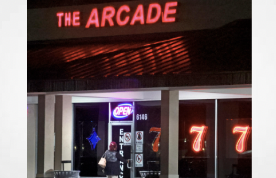First in a three-part series.
As early evening rush hour starts to thin out on Atlantic Avenue in West Delray, a thriving gambling business operates behind a nondescript storefront.
The arcade stands in a strip mall set back from the road. Windows are blacked out except for a red neon “open” sign and the words “Delray Social members only.” The door is locked. Visitors have to be buzzed in.
Inside is a dim room about the size of a fast-food restaurant. Slot machines line the walls, with more machines in the center of the room. About a dozen middle-aged and elderly people sit in front of flickering machines with names like Ultimate Fire Link and MegaCash, feeding paper money into slots and pressing buttons to spin electronic reels.
Florida is home to hundreds of illegal casinos, which can be found on roads and strip malls throughout the state. Some operate openly, with brightly lit signs, Facebook pages, business licenses and weekly promotions. But as police raids become more frequent, many arcades run more secretly, hiding their businesses behind locked doors and black glass.
To investigate Florida’s illegal gambling arcades, the South Florida Sun Sentinel visited about two dozen of them, interviewed players, owners, employees and law enforcement officers, and reviewed court filings, government documents, police reports and corporate records.
Here are the major findings:
-
Arcade owners sometimes hide behind fronts, making it difficult to determine who really owns these businesses. Several owners and managers have criminal records, including convictions for drug trafficking and racketeering. Due partly to the murky nature of their ownership, several arcades have reopened after police raids and arrests.
-
At least nine Florida gambling arcade companies obtained taxpayer-backed loans through the U.S. Small Business Administration. Several of these companies appear to have included false information on their loan applications about the nature of their businesses. Four were later raided for illegal gambling.
-
Arcades have refused to pay jackpots, insisted on paying winners in installments, and manipulated the machines to prevent large payouts. They pose a particular risk to people vulnerable to compulsive gambling.
-
The Florida Legislature this year rejected bills to increase penalties for operators of illegal gambling arcades, after representatives of the American Legion, Veterans of Foreign Wars and other veterans and fraternal organizations expressed concern that the higher legal penalties would hinder their use of slot machines for fundraising.
At a single location, arcades may open and close under three or four different names. They are typically owned by corporations and limited liability companies whose officers, investigators say, are sometimes fronts for the real owners.
Read the full article
https://www.yahoo.com/news/gambling-underworld-illegal-casinos-thrive-120000488.html




